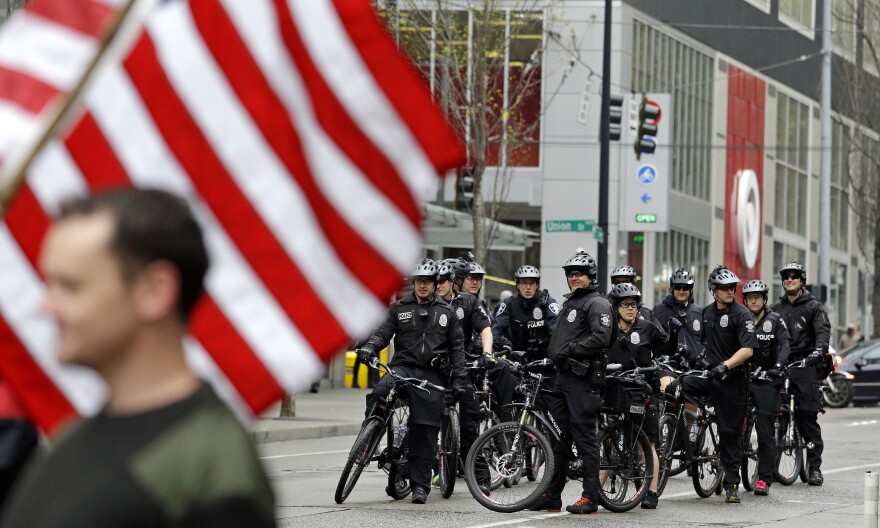It’s been five years since the 2012 May Day protest that left windows shattered in downtown Seattle. May Day events usually turn violent at night, but police were caught off-guard that year when a small group of protesters lashed out in the middle of the day.
Seattle is no stranger to protests that end in chaos, arrests and injuries. In 1999, World Trade Organization protests shocked people around the world. And on every May Day in recent years, after peaceful daytime marches wrap up, mayhem creeps in.
James Sido is a senior manager of media relations and issues at the Downtown Seattle Association which represents the business community and residents. He remembers the year that then-mayor Mike McGinn issued a proclamation of civil emergency.
"I think of it as, 2012 as sort of the flashpoint year, so it's the incident with Niketown and a couple of other storefronts getting their windows busted out. So what we do, is to make sure our downtown retailers and property owners are on the same page with Seattle Police," said Sido.
Every year since, police meet with store owners to make sure there aren’t any sidewalk displays that could be turned into projectiles. Historically, downtown and the Capitol Hill neighborhood have been heavily impacted.
This year, the March for Workers and Immigrant Rights, which tends to be a peaceful event, will start at 11:00 a.m. at Judkins Park in the Central District. Marchers will then work their way up First Hill, before heading downtown. The event is expected to end with a rally at Seattle Center. Mayor Ed Murray says organizers have been coordinating with the city and police, and he’s hopeful participants will demonstrate responsibly.
“Civil disobedience has a long history in this country and including in our city, so people need to make decisions but they also need to understand that we need to keep our freeways and the on- and off-ramps open and we need to have intersections so that we can move through this city for simply safety reasons,” Murray said at a recent press conference.
Other protests are scheduled throughout the day and evening, though not all organizers sought permits. In response to the violent clashes that have broken out during evening events, the Seattle Police Department have updated crowd control techniques in recent years. Bicycle patrols corral protestors and funnel them out of busy areas.
In a recent interview, Seattle Police Sergeant Sean Whitcomb told KNKX, the troublemakers are in the minority.
"Understanding that dynamic between that we're not policing a group, we're looking to police individuals who are disrupting that group's activities, and balancing that with interest of everyone who is there."
Police say they are ready for that delicate dance on May Day, between free speech and public safety.






